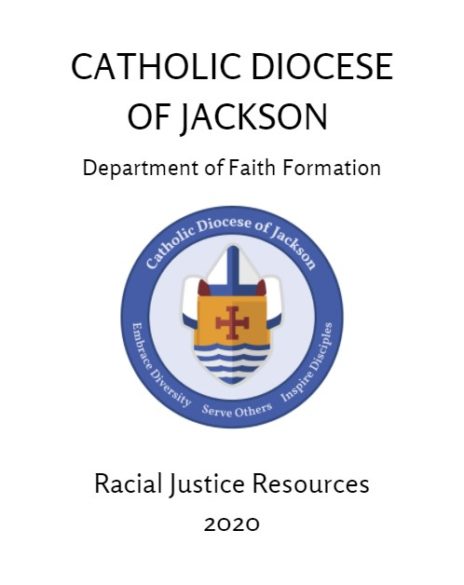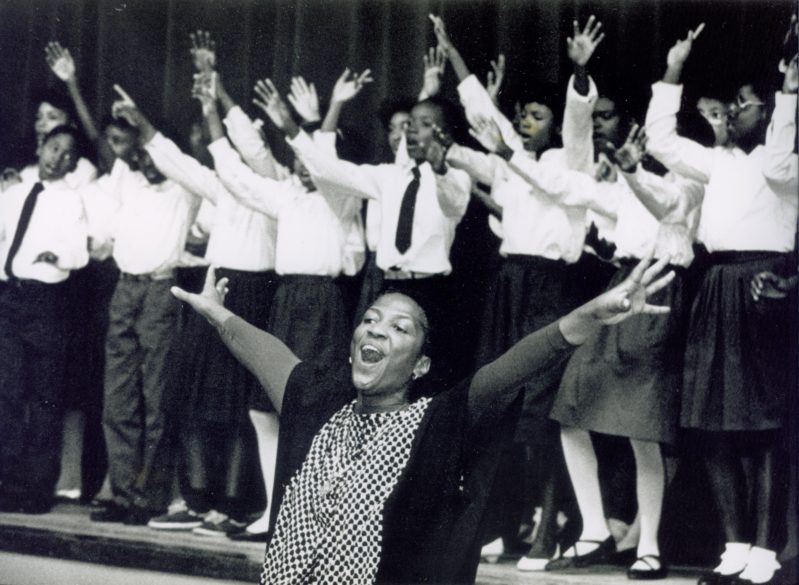Exploring our traditionally African-American parishes
By Fran Lavelle
JACKSON – The mission of the Catholic Diocese of Jackson is to proclaim Jesus as Savior by living the Gospel, so all may experience the crucified and risen Lord. Our mission statement is supported by three priorities one of which is to create inviting and reconciling communities.
We are called to continuously seek ways to support our sacred mission and live out these priorities in our everyday lives. This summer we witnessed the call for racial justice not only in this country but around the globe. As a nation and a church, we are confronted with the sin of racism and are being called to eradicate it in all its deadly forms.

Historically the Catholic Church in Mississippi has not shied away from seeking racial justice, hope, and healing for all African Americans. As in the past we recognize the need to stand tall against racism. In looking at the ways we can embrace diversity in our diocese it became clear that to move forward we needed to specifically understand the current reality of racism and how it impacts our Catholic African American brothers and sisters.
Earlier this fall we sent a survey out to our traditionally African American parishes with the desire to better understand how the diocese can be an agent for change. The following is a summary report of those findings. This is the first step of many in the long and worthwhile journey to create inviting and reconciling communities.
The diocese includes thirteen traditionally African American parishes:
Sacred Heart, Camden
Holy Child Jesus, Canton
Immaculate Conception, Clarksdale
St. Anne, Fayette
Sacred Heart, Greenville
St. Francis of Assisi, Greenwood
St. Benedict the Moor, Indianola
Christ the King, Jackson
Holy Family, Jackson
Holy Ghost, Jackson
St. Joseph, Meridian
Holy Family, Natchez
St. Mary, Vicksburg
We received 99 completed surveys from eleven parishes. A majority of the responses were from women (70 female/26 male). The responses by age are ranked as follows 42 responses from individuals ages 46-65; 38 responses from individuals ages 66-80; nine responses from individuals over the age 80; six responses from individuals ages 30-45; two responses from individuals ages 18-29; and one response from and individual under the age of 18.
Survey participants were asked if they felt the diocese does a good job listening to the concerns of the traditionally African American parishes. Of the 81 people who answered this question, 39 answered “yes” and 42 answered “no.”
When asked about the top three challenges facing their parish the responses were fairly consistent across the diocese. Understandably the pandemic has affected the way in which parishes operate. There were, however, some challenges that were identified that existed before the pandemic and will require creative solutions. The top challenges overwhelmingly included: declining/aging membership; youth programs/activities; finances; community outreach; and evangelization.
In many ways the challenges facing our traditionally African American parishes are the same struggles that all parishes in the diocese and perhaps the country are grappling with. One thing is clear, as we plan for the future, the path forward must include meaningful ministry for young people of all ethnicities. We falsely state that the youth are the future of the church when in reality they are the church of today. In the Apostolic Exhortation, Christus Vivit, To Young People and to the Entire People of God, Pope Francis acknowledges, “We also must give great thought to ways of incarnating the kerygma in the language of today’s youth. Reality is greater than ideas. Time is greater than space. The whole is greater than the part. Unity is greater than the division.”

you inflamed the heart of your servant and religious,
Sister Thea Bowman with an ardent love
for you and all people.
May her prophetic witness continue to inspire us
to share the Good News with all, but especially
with the poor, oppressed and marginalized.
May Sister Thea’s life and legacy compel us to walk together.
Gracious God imbue us with the grace and
perseverance that you gave your servant, Sister Thea, for in turbulent times of racial injustice, she sought equity, peace, and reconciliation. In times of intolerance and ignorance, she brought wisdom, awareness, unity, and charity.
May her light be a beacon of goodness and holiness
in our troubled times. We make our prayer
through Christ, our Lord.
Amen.
Pope Francis is very clear that young people “are the now of God.” They are influencing and impacting the church and the world today, and all persons of faith should be walking alongside them: as peers, as mentors, as guides, and as fellow travelers on the road toward Jesus Christ and the Kingdom of God. Contextualizing that call in practical and effective ways is not only our greatest challenge but our ultimate responsibility.
When asked what the diocese can do to address racism, the clarion call was for greater dialogue among all of God’s people especially with White Catholics. Some of the young responders felt a need to be more integrated and celebrate our diversity. As we continue to develop a vision for racial justice in the diocese, we must ensure that everyone at the table is seen, valued and heard.
A question about what racial justice looks like in our churches, schools and organizations garnered some very thoughtful responses. Far and away most people’s view of racial justice comes down to dignity and respect. One respondent noted, “Racial justice should be visible, practiced, and discussed by all races coming together recognizing problems, developing solutions, and moving toward resolving those problems together.” The sense that we cannot create racial justice in a vacuum was quite clear. If we are to achieve this goal, we must do it together.
When asked how Sister Thea Bowman inspires individuals to be the disciples Jesus Christ desires us to be, her presence is still prominent in many of the responses. Sister Thea was undoubtedly a great inspiration to many people. What made her exceptional was her authentic embrace of the call to love one another.
One older woman stated, “Her legacy of love for God and humankind kindles in me a stronger will to serve, not to be served and do it abundantly. And, to love my brother as Jesus loves me.”
We are using the USCCB’s document “Open Wide Our Hearts: The Enduring Call to Love – A Pastoral Letter Against Racism” as a framework to direct our conversations and actions. It was developed by the Committee on Cultural Diversity in the church and was approved by the full body of bishops as a formal statement at its November 2018 General Meeting. We encourage parish leaders to consider undertaking a study of the document.
In Mark 4:8, the parable of the sower, we are reminded for things to grow it is necessary to sow our seeds on good soil, “And some seed fell on rich soil and produced fruit. It came up and grew and yielded thirty, sixty, and a hundredfold.” Moving forward we will undertake a survey of all the parishes in the diocese. It is our hope that we can find fertile soil where the seeds of justice and racial harmony can grow.
There is not a better day than today to begin the difficult but necessary work of creating inviting and reconciling communities. We are in desperate need of hope, healing, and reconciliation in our church and in our world. Formed by the four marks of the church may we truly be a One, Holy, Catholic, and Apostolic people. As always, the journey begins with One.
(Fran Lavelle is the director of the Department of Faith Formation for the Diocese of Jackson.)
